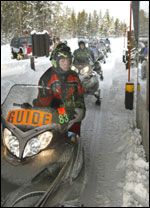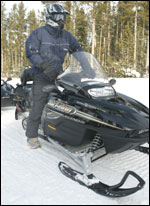The past few days have brought two more odd legal twists and turns to the Yellowstone snowmobile saga, which is becoming more litigiously complex and far-flung than a John Grisham novel.

She’s got a ticket to ride.
Photo: NPS.
The story is essentially a protracted game of legal Ping-Pong: The Clinton administration served the ball when it ordered a phaseout of snowmobiles in Yellowstone and Grand Teton national parks back in January 2001, just before Clinton left office. The Bush administration returned the serve in the early days of its term by freezing that decision, then reversing it in March 2003. Next, in December 2003, a D.C. federal appeals court under Judge Emmet Sullivan reversed the Bush administration’s reversal and ordered the National Park Service to reinstate the phaseout. Then the state of Wyoming and the snowmobile industry appealed that decision, asking for an emergency stay. Last week, a federal judge in Wyoming, Clarence Brimmer, issued a restraining order against the original Clinton rule. And, in the very latest volley, yesterday Sullivan threatened to hold NPS officials in contempt for violating his orders and boosting the numbers of snowmobiles allowed in the parks.
“Yes, it’s that convoluted!” said Abigail Dillen, an attorney at Earthjustice who represents the Greater Yellowstone Coalition, an alliance of environmental groups that, to make matters even more complicated, is serving yet one more counter-lawsuit against the Wyoming court decision on the grounds that the court lacked jurisdiction over the matter and its decision conflicted with the D.C. court ruling.
In the meantime, however, Brimmer’s restraining order is in effect, and the snowmobile industry will be sitting pretty for the last month of Yellowstone’s winter season, which ends in mid-March. The day after Brimmer’s decision, the National Park Service authorized the entry of 920 snowmobiles into Yellowstone and Grand Teton national parks every day — up from 493 per day during the phaseout.

What’s the snowmo-deal?
Photo: NPS.
Surprising support for Brimmer’s decision came today from New York Times columnist Nicholas Kristof, who has consistently opposed the Bush administration on other environmental decisions. He rhapsodized on the op-ed page about the pleasures of vrooming through a wintry Yellowstone astride a snowmobile. According to Kristof, this is the best way “to get Americans into the wilderness.”
Brimmer’s move was more predictably applauded by Wyoming Gov. Dave Freudenthal (D), who said, “The people that are suffering under the move toward banning snowmobiles are the small-business owners in and around the parks.”
Environmental groups, for their part, believe that Yellowstone “belongs to the public and the nation as a whole, not to the snowmobile industry and not to a few local business owners,” said Dillen.
But all this begs the question: Why on Earth has this become such a big deal? Snowmobile manufacturers make up a tiny and relatively powerless industry, so why has the Bush administration thrown its weight so solidly behind it? And why has this matter drawn more public response than any other land-management issue since the Bush administration took office? More than half a million public comments have been submitted in support of the snowmobile ban.
“This is on some level a philosophical — or a symbolic — argument,” said Dillen. “Yellowstone was the first national park, which makes it iconic and emotionally powerful for Americans.”
On the other side is the belief held by many Westerners — one the Bush administration seems to share — that recreating on public land is a personal, god-given right, a freedom. “It’s that Manifest Destiny attitude: This is our land and we can do with it what we want,” said D.J. Saunders, a policy director at the Fund for Animals, which has been active on the Yellowstone snowmobiling issue. “And don’t forget this is Cheney territory — he grew up in Wyoming and he dictates much of the Bush administration’s aggressive policy in the West.”
There’s one more political tidbit here to consider, and that’s Brimmer’s track record, which suggests that he has acted as something of a handmaiden to the Bush administration. It was Brimmer, for instance, who blocked the Clinton administration’s so-called “roadless rule,” which banned logging and development in roadless areas of national forests, dismissing it as an egotistical whim. “The court cannot condone what the Forest Service has done in its rush to provide environmental fame for a president in the last days of his term,” Brimmer wrote.
Mark Pfeifle, spokesperson for the Department of Interior, sounded a similar note when commenting on the snowmobile controversy: “To say that [the phaseout] was a glorious environmental achievement is bogus because it was done in the final nanoseconds of the Clinton administration — after Florida and the Supreme Court had ushered Bush in.”
And yet, more than a million public comments were filed in support of the roadless rule, and more than 90 percent of the public comments on the snowmobile issue supported a ban. Perhaps an egotism driven by serving the will of the people is preferable to a cronyism willing to dismiss it.

